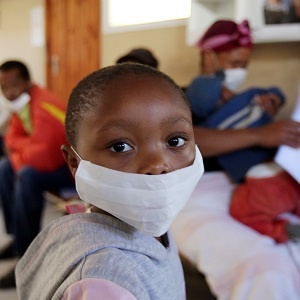
Childhood TB remains a major health problem in South Africa while nearly half a million children under the age of 15 years live with HIV in South Africa.
Research into TB and HIV among children was a central focus for four PhD full-time clinicians who recently graduated from the Department of Paediatrics and Child Health at Stellenbosch University.
“What is remarkable about these PhD candidates is that they are full-time clinicians, taking care of children on a daily basis and successfully combining their research with active service delivery,” said Professor Mariana Kruger, executive head of Paediatrics and Child Health at Stellenbosch University.
Dr Regan Solomons, a paediatric neurologist at Tygerberg Children’s Hospital in Cape Town, investigated ways of improving the early and more accurate diagnosis of TB meningitis in children.
Read: How South Africa is combatting TB
Passionate about raising awareness about TB meningitis, he said the disease was a major cause of death and disability in young children, yet it was completely treatable if detected early.
The most important findings of his study were that a research case definition based on clinical, laboratory and radiological findings provided excellent diagnostic accuracy for detecting TB meningitis. Cerebrospinal fluid glucose and protein detected TB meningitis with good sensitivity.
The research revealed that newer diagnostic tests were insufficient to rule out TB, but found that when they were positive, unnecessary treatment delay and potential life-threatening consequences were prevented.
Dr Solomons, who successfully defended his PhD in Amsterdam after doing a joint PhD degree at Stellenbosch University and Vrije University of Amsterdam. It was the first joint PhD awarded by the two universities.
In her PhD thesis, Dr Steffi Thee from Charite Universitätsmedizin in Berlin, Germany, investigated the safety of first- and second-line anti-tuberculosis drugs in children. Her research through the Desmond Tutu TB Centre at Stellenbosch University, identified critical gaps in the current knowledge in the management of children with both drug-susceptible and drug-resistant TB.
Read: The fight against HIV is far from over for SA
Thee said her research provided essential evidence on both the dosing and safety of TB medicines, informing international treatment guidelines for childhood TB. However she said more studies in larger number of children with different genetic backgrounds, HIV co-infection, nutritional status, and with higher drug doses, novel treatment regimens and child-friendly formulations, were needed.
Dr Anna Mandalakas, from the Baylor College of Medicine in Texas, looked into the impact of Preventative Therapy (PT) as a TB control strategy to reduce the burden of childhood TB in communities. She looked at questions such as which factors accurately predict which children are at highest risk of TB.
Dr Mandalakas carried out her research at the Desmond Tutu TB Centre.
The World Health Organisation routinely recommends PT medication in children younger than five years old as well as HIV-infected children who are in close contact with someone with infectious TB.
In her thesis, Dr Ute Feucht, paediatrician and Adjunct Professor in the Department of Paediatrics and Child Health at the University of Pretoria, focused on improving the care of HIV-infected and –affected children during the implementation phase of the large-scale antiretroviral therapy (ART) programme in South Africa. She conducted her research at Kalafong Hospital in Tshwane.
Read: World first: child-friendly tuberculosis treatment will be available from 2016
Dr Feucht interviewed caregivers and used clinical data to determine the gaps in the system and why children were at risk of HIV-infection.
While there had been improvements in HIV-diagnosis in mothers as well as infants, she said there were some worrying gaps, such as early infant diagnosis and testing at primary healthcare facilities, as well as ensuring prevention by educating mothers prior to conception.
“Ensuring access to care is critical for HIV-infected children,” said Dr Feucht. She said interviews with caregivers had revealed that children had good access to routine healthcare, but that mothers weren’t getting adequate psychosocial support.
Dr Feucht said South Africa was in need of a ‘clear strategy’ regarding paediatric case finding in order to identify HIV-infected children outside of the Prevention of mother-to-child Transmission (PMTCT) testing.
In 2012, an estimated 410,000 children aged 0 to 14 were living with HIV in South Africa, according to HIV and AIDS information website, AVERT. From 2002 to 2012, HIV prevalence declined among children, while the scaling up of antiretroviral treatment has reduced child mortality by 20%.
Read more:
Stellenbosch professor gets international TB award




 Publications
Publications
 Partners
Partners











